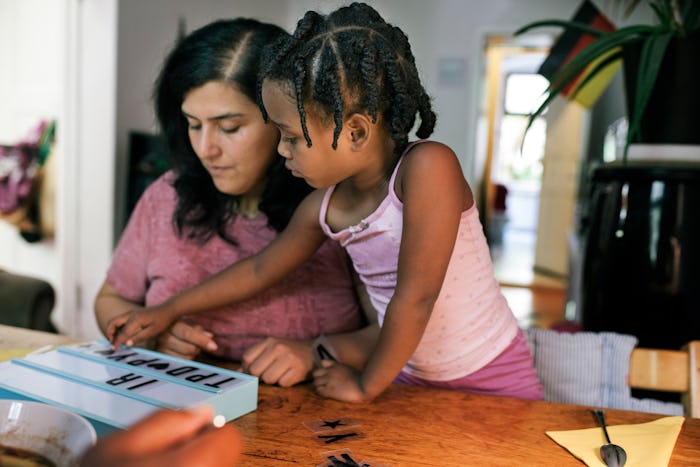Life

How To Keep Kids & Babysitters Safe During Coronavirus, According To Experts
States are opening up, and some people are going back to work, heading to outdoor restaurants, and attempting to add some semblance of normalcy in their lives. But people also just need some extra care for their kids. Whether you leave the house or just need a caregiver to keep your children safe while you're working from home in another room, you'll need to know how to keep your kids and your babysitter safe during COVID.
Having spent every single day of the past 130 days with my children and husband in our New York City apartment, I have to be honest — the idea of getting a sitter and spending some time away from the kids sounds like an absolute dream. But I worry not only for the safety of my children in such a scenario, but also for the safety of the babysitter. Needing to know what steps I should take if ever I felt brave enough to take them, I contacted pediatric pulmonologist Dr. Joi Lucas to find out how I could be as cautious as possible. She tells Romper, "Testing of children before starting school or a new babysitter is one way to ensure both are negative [for the virus]. However, it does not guarantee a safe interaction if either child or babysitter are exposed after their test."
Lucas says that beyond routine testing, the adults in a babysitting situation should wear a mask, socially distance themselves when they can, and frequently wash or sanitize their hands. She also recommends daily temperature checks before the kids and sitters are exposed to one another, and that only small groups of children should be with a sitter.
Dr. Sharon Nachman, Chief of the Division of Pediatric Infectious Diseases at Stony Brook Children’s Hospital, gives similar advice to Romper. "It would be great to have babysitters tested just before they start working for you, but that only tells you about one point in time, and that’s not enough information. It is more important to understand where they are and what they are doing when not caring for your child." Meaning that you need to know if they're masking up when they go out, if they're going to parties where others are not wearing masks, things like that.
And on the flip side, your babysitter needs to be able to trust you, too. To keep your babysitter's exposure limited, you'll also need to social distance, and possibly make your child's babysitter the only interaction you have with anyone outside of your home.
It's also important to keep your child's care simple. "Keeping one babysitter is better than switching them every day. The more people in your child’s cohort/circle, the more possible for them and you to come into contact with an asymptomatic carrier."
But beyond the testing and questions, how do you keep your kids and your babysitter safe during a global pandemic at your home? Nachman says, "Hand-washing when they come into your home is a great first step." And, if your kids are comfortable with it (or will get comfortable with it), masks are a good idea for sitters and children over age 2.
You can also encourage your babysitter and child to spend more time outside if you have a safe space free from neighbors and other people. Being outdoors can lower your chances of being infected with coronavirus, and can give your child and babysitter a chance to interact without being cooped up in your home.
You should also try to plan ahead. With test results often taking several days, everything is up in the air pretty much all the time. You'll need to develop a lot of trust between your family and your babysitter, and both of you will need to follow some rules for the mutual goodness of all.
Experts:
Dr. Joi Lucas, pediatric pulmonologist
Dr. Sharon Nachman, Chief of the Division of Pediatric Infectious Diseases at Stony Brook Children’s Hospital
If you think you’re showing symptoms of coronavirus, which include fever, shortness of breath, and cough, call your doctor before going to get tested. If you’re anxious about the virus’s spread in your community, visit the CDC for up-to-date information and resources, or seek out mental health support. You can find all of Romper’s parents + coronavirus coverage here.